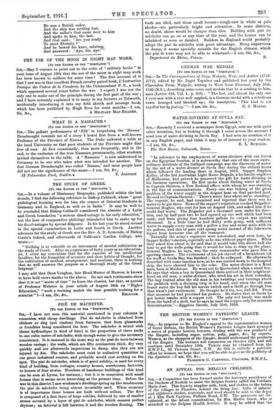PISS DE M1CHEFER.
(To THE EDITOR OP THE " SPICTeTOE."1 have not seen this material mentioned in your columns in connexion with cheap dwellings. Ilse de machefer is obtained from clinkers or slag (not cinders) from furnaces, that from glassworks or foundries being considered the best. The machefer is mixed with chaux hydraulique [a kind of lime] in the proportion of three sacks to one cubic metre of machefer, with enough water to give the necessary consistency. It is rammed in the same way as the piste de terre between wooden casings ; the walls, which are fifty centimetres thick, dry very quickly and are afterwards impervious to damp, also they are not injured by fire. The machefer must exist in unlimited quantities in our great industrial centres, and probably would cost nothing on the spot. The piss de machefer, which is of great solidity, is used for every kind of building, from cottages, country houses, warehouses, factories, to houses of four stories. Numbers of handsome buildings of this kind can be seen at Lyons, for instance ; but it is in connexion with small houses that it seems more interesting at the present time. Before the war in this district I saw workmen's dwellings spring up like mushrooms, the piss de machefer being almost invariably used. When economy is of importanoe these houses are built without milers. The floor is composed of a first layer of large cobbles, followed by one of smaller stones covered by a layer of piss de machefer, which ensures perfect dryneee; an interval is left between it and the wooden flooring. The
roofs are tiled, and these small houses—rough-east in white or pale shades—are particularly bright and attractive. In some districts, no doubt, slates would be cheaper than tiles. Building with pis6 do machefer can go on at any time of the year, and the houses can be inhabited as soon as finished. Builders in England could probably adopt the piii6 de machefer with great advantage. Being impervious to damp, it seems specially suitable for the English climate, which the piste de terra may not be able to withstand.—I am, Sir, ho.,






























 Previous page
Previous page